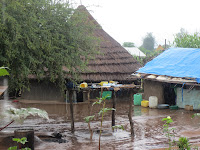20 Aug 2012
After over 50 years of civil war and violent fighting, on July 9th, 2011, South Sudan was recognized by the International Community and the United Nations as a sovereign nation.
Flew on MAF (Mission Aviation Fellowship) from Lokichoggio, Kenya to Juba, South Sudan; the nation’s capital. After passing Immigration steps, were forced to sit out a heavy rainstorm prior to continuing our journey.
Met with Government official to discuss our interest in providing water and shelter/housing to any of South Sudan’s developing Villages. He was very supportive and his comments reinforced our strategy of self-sustaining; stating that “If the people know how to, and can make their own food, then they eat with dignity”. A wonderful focus of our work.
After crossing the Nile River, commenced the journey to Torit, our destination in South Sudan. The roads continue to be a major obstacle in travel with continued stop, bounce, thud, bounce and go, repeated over and over for some 4½ hours. After all, these are the roads that the original Land Rover was designed for.
Torit was the location of the first shots of the war for independence - very historical site in the life of this young 13 month old nation.
With all the recent rains, this region of the country is very lush with full vegetation, nestled at the foothills of the Sudanese mountain ranges. The rains however now threaten to flood many villages and worse yet, destroying many crops. These are some of the challenges the peoples of the small, remote, developing villages continually face.
They remain internally optimistic and are extremely welcoming to visitors from the USA. Multiple times, we were thanked for the support the US provided in accomplishing their independence, their freedom, liberty and prosperity.
Juba - Capital of new country; South Sudan ... and signs still exist on the road to Torit from the Civil Wars that lead to the formation of the new country.





